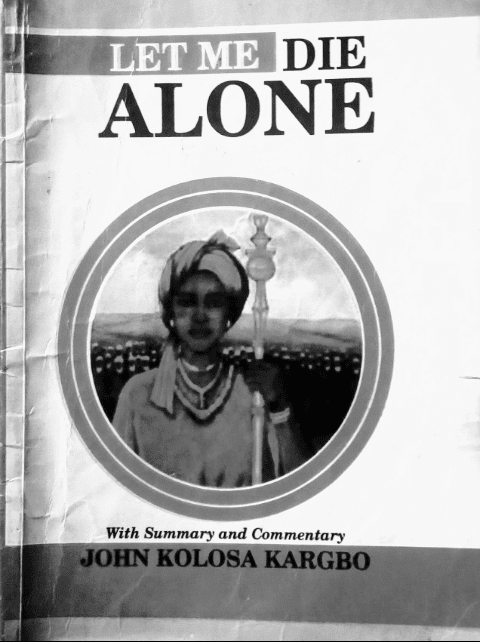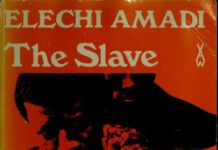In Chapters One to Five of Part One, we have encountered the characters of Mama Orojo, Nii Tackie, Massa, Ibuk, and Tom Monday. Obviously, Mama Orojo and Nii Tackie are in the center of the narration.
While Nii Tackie is trying to nurse Massa to good health, Mama Orojo feels the vacuum of her long separated brother. Nii Tackie does multiple works in order to make ends meet while Mama Orojo is doing well in her business. Tom Monday, on his part, is interested in Mama Orojo and it appears he would do anything to win Mama Orojo’s love.
Read: (Part 1) Chapter 1 to 5
CHAPTER 6
In this chapter, the rottenness of the Ghanaian society is portrayed through its physical ruins as expressed by the debris of Kantamanto market and the putrid lagoon. We see this through the eyes of Nii Tackie the contrast between Ghana of the past and of the present.
Nii Tackie is walking across the streets of Accra when he sees Aaron. He calls out to him but the latter is beyond hearing distance. Nii Tackie avows his admiration for Aaron because the latter is an inventor. He believes “every inventor was a great man”.
Then, the reader is apprised of Kantamanto market, now no more being used, and all it represented. The defunct market used to be a home to traders from different tribes and races across international divides.
Kantamanto gave expression to African unity. One could, standing at one spot, sample the diverse races and tribes in Africa and Asia.
Gao from Mali; the Yoruba (Anago) and Ibo from Nigeria; Syrians and Lebanese all carried out their trading activities in the market. Katamanto is the African unity Ghana lacks.
The market was brought to ruins by the combined efforts, each at different time, of “an unexplained fire” and the army who saw its remains, ‘Kalabule’ as shameful to the Ghanaian society.
It is a relic of a part of Ghanaian history when there was no xenophobia and all nationals made a living in the country without fear and restraint.
Nii Tackie walks to the stinking Korle Lagoon. The lagoon also symbolises the pervading rottenness of the Ghanaian society and everything wrong with Ghana around this period. Apart from the pungent smell and collected wastes, it is the hideout or to put it better, the rendezvous of young men who smoke marijuana.
Nii Tackie squats around the lagoon to excrete. Quite an eyesore for an Assistant Bank Manager to condescend himself to and a clear indication that all is not well with his country in financial terms. After he is done, he finds the body of a dead woman and hurries away.
Read Also:
- Characterisation in Alex Agyei–Agyiri’s UNEXPECTED JOY AT DAWN
- Alex Agyei-Agyiri’s UNEXPECTED JOY AT DAWN: A Few Things You Need To Know
CHAPTER 7
Massa is retching when Nii Tackie walks in. Even while she is in deep pains, she downplays it as if it were nothing.
‘I’ve a little pain in my ribs.’ She always played down the extent of her pains. (Page 36)
The author portrays Massa as a strong woman despite her critical condition. Massa diverts the discussion from her condition to the rats and mosquitoes troubling her.
Nii Tackie and Massa sleep. Nii Tackie has had a full night’s sleep in a very long time due to Massa’s critical illness.
Some days, his entire night’s sleep lasted only a few minutes; the rest of the time he watched over his ailing lover. (Page 36)
Nii Tackie wakes up, shouting from his sleep:
‘Blackness is not enough! Blackness … Enough! Three stripes only …!’
Massa is observant enough to know Nii Tackie has been having nightmares like this. It’s obvious that the alienation issue is starting to take toll on Nii Tackie.
Now let me paint the scenario.
Nii Tackie was born and bred in Ghana. He’s given a Ghanaian name, particularly of Ga origin. He has lived his all his life in Ghana. He is like every other Ghanaian but what distinguish him from every other Ghanaian are his tribal marks. Nothing can change that; not even his Ghanaian accent and mannerisms. Everyone, including his colleagues at work, see him as an alien because of this. The view is further reinforced when Nigeria begins it Ghanaian-targeted alien expulsion. As a Nigerian in Ghana, he has every reason to worry.
Only Massa, a staunch Pan-African, sees Nii Tackie in a different way. She believes that as Africans, “where one finds peace, there is one’s home also”. She douses Nii Tackie’s worry.
CHAPTER 8
Mama Orojo plans to travel to Ghana. She is making preparations for the trip. She plans to take gifts along for her brother and “the old landlord and surrogate father of her brother”.
The author intimates the readers of Mama’s business empire, how she maintains a strong connection with Nigerian politicians and how this has been getting her contracts. Her company is ‘Mama Sansi Group of Companies’.
She is the first to build a house in Ijase. Her company is responsible for the construction of “more than half of the houses there too”. The author also hints that Ijase has become a target for robbers.
Mama Orojo creates a hollow in her bible cover with a knife. She hides six hundred naira (in twenty naira denomination) in it and seals it with glue.
We encounter Mama Orojo’s tenants: Idem (a provision store owner) and her husband, Wachuc (a shift worker in a printing house). Idem is found saying “Omo Ghana no go go” when two labourers with dirtied clothing speak impeccable English to her. This is a pointer that Ghanaians are the primary victims of the alienation law. Idem is equally concerned about how her business will be affected by the expulsion law because most of her customers are aliens.
Mama reflects on her impending visit to Ghana. She remembers how she had to leave Ghana in compliance with its indigenisation policy and how she had started her business with sales of second-hand clothes. Her father gave her the name Mama; her other names being Olu Orojo.
Members of Corpus Kristi (a seven-member policy-making body of Amen Kristi) come to her place for a meeting on their next mission and the running cost. Mama Orojo is the treasurer of the local church, and thus a member of Corpus Kristi. The only non-member present at the meeting is Ibuk who in a way fills in for the dead seventh member.
The setting changes to a construction site undertaken by Mama Sansi Group of Companies. Mama Orojo, the director, visits the site before she leaves for Ghana.
Here, we are beginning to see the effect of the new immigration law in the form of scarcity of labour force. The conversation that ensues between workers hints that there is hunger in Ghana, which is not very far from the truth.
CHAPTER 9
This chapter shuffles between Ghana and Nigeria. Opening with Ghana, Linda asks Nii Tackie to come to her place in the evening for a treat while Nii Tackie says he will think about her request.
In Nigeria, around 10.30am, Mama Orojo encounters delay on her way to the airport. First, there is traffic gridlock caused by two quarrelsome drivers. Then, her car develops fault. And her flight is scheduled for 10.45am. She has to take a taxi to catch the scheduled flight.
When examining her bag at the counter, the immigration officer is surprised that she does not have “excess money, foreign money, contraband goods”. All she has include “a few clothes, tinned food and a bible”.
He begins to wonder how she intends to survive in Ghana. From him, we learn about the newspaper reports about the widespread molestation of Nigerians in Ghana. He advises Mama Orojo to be careful while in Ghana. Ironically, sealed right in Mama Orojo’s bible cover is six hundred naira.
The setting then moves to Ghana. Nii Tackie reckons his debt. He owes the bank he works with a thousand cedis. He is banking on his leave allowance and an extra six hundred cedis (from his part-time teaching job) for taking Massa to the faith healer and for his survival during leave.
Linda reminds him of her request; adding that she wouldn’t have invited him if it is not special. Nii tackie tries to make her see that there is nothing to him than his title when Linda addresses him as “Assistant Bank Manager Nii Tackie”. However, Linda does not seem to understand.
Nii Tackie goes on to interview loan applicants.
CHAPTER 10
Mama Orojo is aboard flight HT954. The flight is stormy and she is not particularly comfortable. She fears the plane may crash. A co-passenger strikes a conversation with her.
The unnamed man (we will encounter him many times later in the novel) piques Mama Orojo’s interest in gold. He brings out a gold ring. Mama is fascinated by gold products and the prospect of trading in gold.
‘I like gold products,’ she intimated.
The man offers to sell the gold ring for two thousand five hundred cedis. Mama jumps at the offer.
Mama Orojo, when asked, intimates him that she is going to Ghana after fifteen years of leaving the country. She was eighteen when she left Ghana. This means she is now around thirty-three years old.
Mama seeks the man’s help as to where to change naira to cedis. Mama Orojo acknowledges Ghana as her second home as the plane descends.
 WHATSAPP: Click HERE to join the new Literature PADI WhatsApp group to receive latest updates on your phone and for further literary discussions!
WHATSAPP: Click HERE to join the new Literature PADI WhatsApp group to receive latest updates on your phone and for further literary discussions!









Nice work. Please can you summarize chapters 11 to 15 thank you.
pls can you summarise part 2 chapter 9-23. thank you
pls can you summarise part 2 chapter 9-23. thank you
Please can you summarise part 2 chapter 9-23. thank you
Bravo.an excellent work.can you sympathize part1 chapter 11 of the prose
It is igbo not Ibo
Thanks for the observation. Very kind of you. However, the author used the term “Ibo” in his novel. I did not intend any mischief by repeating in my analysis that same term as used within the context of the novel.
Excellent work can you please summarize chapter 15 to 29
Thank you so much.GOD bless you so much k
Thanks you so much.can you summarise chapter 10 to 20
Not what I asked
Good work thanks
Thank you so much❤️🤗
Comments are closed.